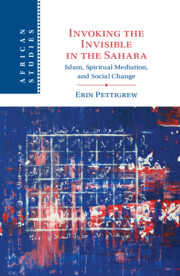
-
Select format
-
- Publisher:
- Cambridge University Press
- Publication date:
- January 2023
- January 2023
- ISBN:
- 9781009224581
- 9781009224611
- 9781009224567
- Dimensions:
- (229 x 152 mm)
- Weight & Pages:
- 0.69kg, 370 Pages
- Dimensions:
- (229 x 152 mm)
- Weight & Pages:
- 0.54kg, 370 Pages
- Subjects:
- Islam, Area Studies, African Studies, History, Religion, African History
- Series:
- African Studies (159)
You may already have access via personal or institutional login- Subjects:
- Islam, Area Studies, African Studies, History, Religion, African History
- Series:
- African Studies (159)
Book description
In this innovative new history, Erin Pettigrew utilizes invisible forces and entities - esoteric knowledge and spirits - to show how these forms of knowledge and unseen forces have shaped social structures, religious norms, and political power in the Saharan West. Situating this ethnographic history in what became la Mauritanie under French colonial rule and, later the Islamic Republic of Mauritania, Pettigrew traces the changing roles of Muslim spiritual mediators and their Islamic esoteric sciences - known locally as l'ḥjāb - over the long-term history of the region. By exploring the impact of the immaterial in the material world and demonstrating the importance of Islamic esoteric sciences in Saharan societies, she illuminates peoples' enduring reliance upon these sciences in their daily lives and argues for a new approach to historical research that takes the immaterial seriously.
Reviews
‘Invoking the Invisible in the Sahara situates battles over the meaning and control of Islamic esoteric knowledge (ḥjāb) in Mauritania's history of racial and political struggles dating to the pre-colonial era. Innovatively using contemporary social media alongside traditional textual and oral sources, Pettigrew reveals the resilience and adaptability of both ḥjāb power and practitioners. ‘Magic' in Mauritania has not disappeared; it has become a marketable commodity.'
Ann McDougall - University of Alberta
‘Combining methodological rigor with conceptual dexterity, this empirically rich, multilayered historical ethnography of l'hjab in the Saharan West documents how often-unseen forces and entities shape history, social structure, religious norms, and political power. This scintillating book ultimately reorients our understanding of the so-called Islamic esoteric sciences.'
Zekeria Ahmed Salem - Northwestern University
‘Erin Pettigrew's monograph offers a fresh interpretation of Islam and societal life in the Saharan West. Replacing local histories of Muslim esoteric sciences within the various cultural and social contexts that nurtured them, the author masterfully challenges notions of marginality and periphery in Islamic studies and African history.'
Ismail Warscheid - Centre National de la Recherche Scientifique
‘Erin Pettigrew combines extensive anthropological field research with a meticulous documentary investigation and gives, along the way … a beautiful lesson in historical anthropology.’
Abdel Wedoud Ould Cheikh Source: L’Homme. Revue française d’anthropologie
‘Pettigrew deserves enormous credit for having taken an extremely difficult topic and rendered it comprehensible and relevant to those interested in the history of Muslim societies in Africa.’
Bruce Hall Source: American Historical Review
Contents
Metrics
Altmetric attention score
Full text views
Full text views help Loading metrics...
Loading metrics...
* Views captured on Cambridge Core between #date#. This data will be updated every 24 hours.
Usage data cannot currently be displayed.
Accessibility standard: Unknown
Why this information is here
This section outlines the accessibility features of this content - including support for screen readers, full keyboard navigation and high-contrast display options. This may not be relevant for you.
Accessibility Information
Accessibility compliance for the PDF of this book is currently unknown and may be updated in the future.


